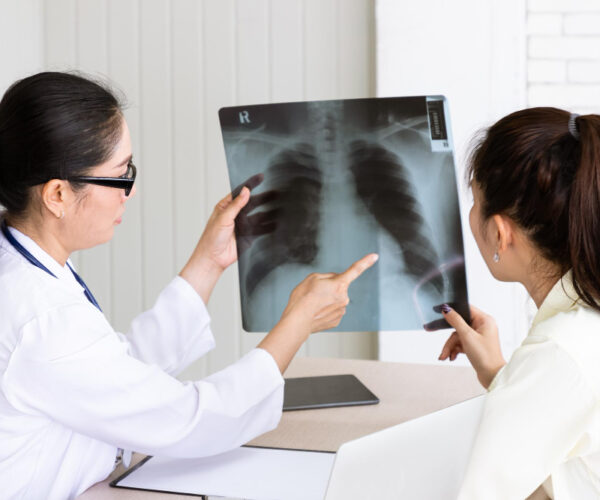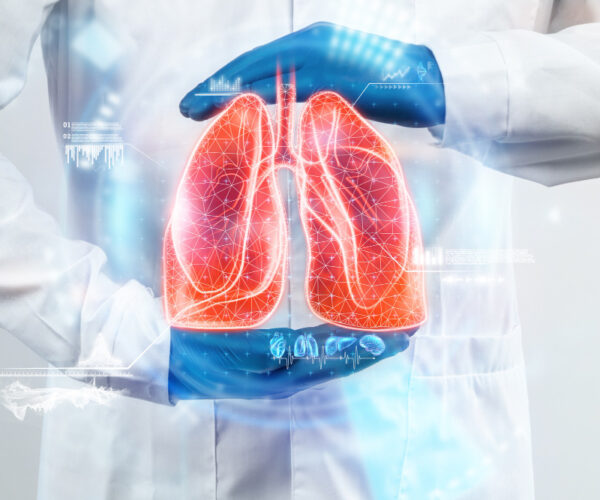Pulmonology is a branch of medicine that focuses on the diagnosis and treatment of diseases and conditions affecting the respiratory system. Pulmonologists are physicians specially trained in pulmonary medicine, equipped to address a wide range of respiratory issues, from common ailments like asthma and bronchitis to complex conditions such as COPD and pulmonary fibrosis.
At Tricorder Clinics, our Pulmonology department is dedicated to providing specialized care for patients with respiratory conditions. Led by experienced pulmonologists, we offer comprehensive diagnostic and treatment services to help you breathe easier and improve your quality of life.
What is the role of the Pulmonologist?
Pulmonologists play a crucial role in the management of respiratory health, offering expertise in the diagnosis, treatment, and prevention of pulmonary diseases. They conduct thorough evaluations, perform diagnostic tests, and develop personalized treatment plans tailored to each patient’s specific needs. Additionally, pulmonologists may provide guidance on lifestyle modifications, prescribe medications, and perform procedures such as bronchoscopy and pulmonary function tests to assess lung function and determine the best course of action for treatment.
- Specialized in diagnosing and treating respiratory conditions.
- Conducts diagnostic tests like pulmonary function tests and bronchoscopy.
- Prescribes medications and develops personalized treatment plans.
- Offers guidance on lifestyle modifications to improve respiratory health.
- Provides comprehensive care for conditions such as asthma, COPD, and pulmonary fibrosis.
Respiratory Care
Expert treatment for all respiratory conditions, ensuring optimal lung health.
Diagnostic Expertise
Accurate assessments and tests to diagnose and treat respiratory issues.
Personalized Treatment Plans
Tailored approaches for every patient, promoting improved breathing and wellness.
Respiratory Wellness
In our Respiratory Wellness section, we focus on proactive measures to enhance lung health and overall respiratory function. Through education, lifestyle guidance, and preventive strategies, we empower individuals to take control of their respiratory well-being. Whether you’re looking to optimize lung function, prevent respiratory infections, or manage chronic conditions, our team is here to support you on your journey to respiratory wellness.


Most popular and trending Questions?
Explore answers to common questions about respiratory health, conditions, prevention, and management in our Respiratory Wellness FAQs. Our goal is to provide you with valuable information to help you maintain optimal lung health and well-being.
Common respiratory issues include asthma, chronic obstructive pulmonary disease (COPD), bronchitis, pneumonia, and allergies. Symptoms may include coughing, wheezing, shortness of breath, chest tightness, and respiratory infections. If you experience any respiratory symptoms or concerns, it’s important to consult with a healthcare professional for proper evaluation and management.
Improving lung health and respiratory function can be achieved through various lifestyle modifications and preventive measures. This may include quitting smoking, avoiding exposure to environmental pollutants, maintaining a healthy weight, practicing good hygiene to prevent respiratory infections, staying physically active, and following a balanced diet rich in fruits, vegetables, and whole grains. Additionally, regular exercise and breathing exercises can help strengthen respiratory muscles and improve lung capacity.
To reduce the risk of respiratory infections, it’s important to practice good hygiene habits, such as washing hands frequently with soap and water, avoiding close contact with sick individuals, covering your mouth and nose when coughing or sneezing, and staying up to date with recommended vaccinations, including the flu vaccine and pneumococcal vaccine. Additionally, maintaining a healthy lifestyle, managing chronic conditions effectively, and avoiding exposure to environmental pollutants can help strengthen your immune system and reduce susceptibility to respiratory infections.
You should seek medical attention if you experience persistent or severe respiratory symptoms, such as difficulty breathing, chest pain, persistent coughing or wheezing, coughing up blood, fever, or unexplained weight loss. These symptoms may indicate a serious respiratory condition that requires prompt evaluation and treatment by a healthcare professional. If you have concerns about your respiratory health, don’t hesitate to schedule an appointment with your healthcare provider for proper assessment and management.

